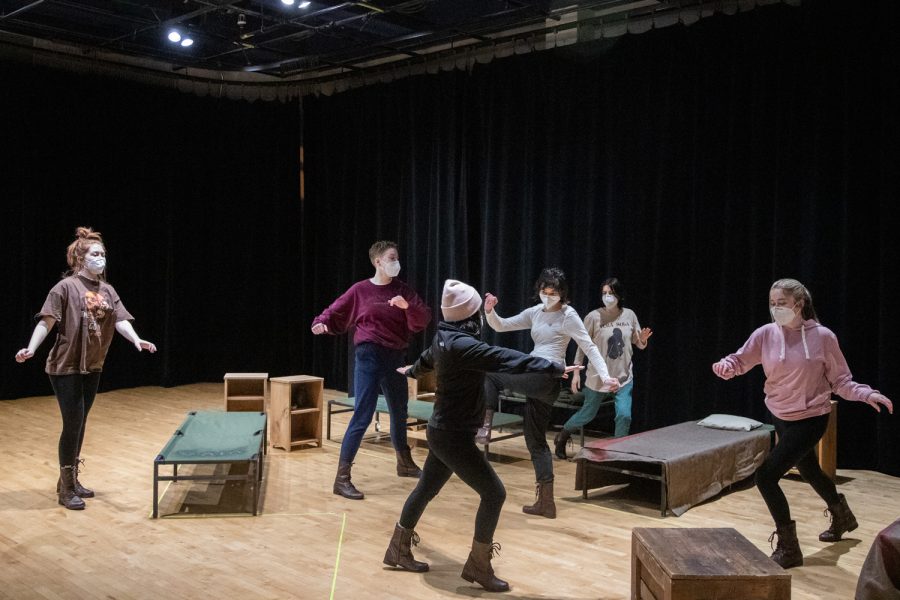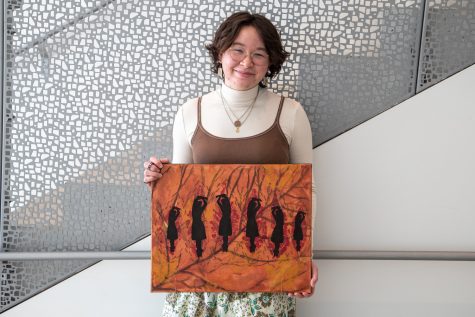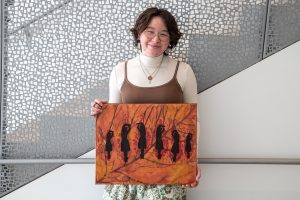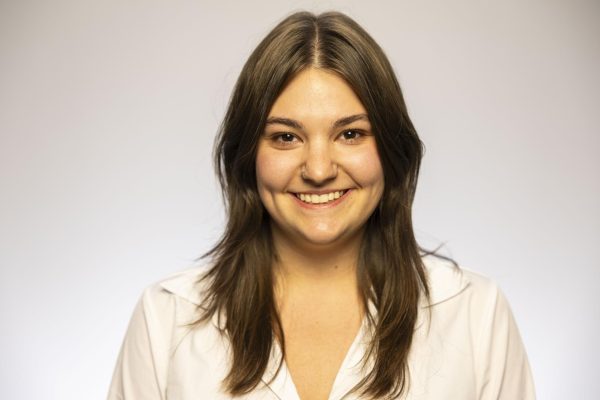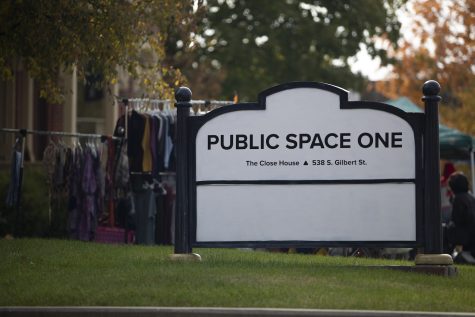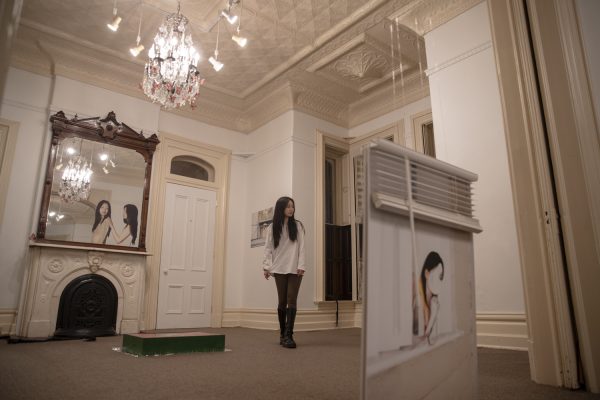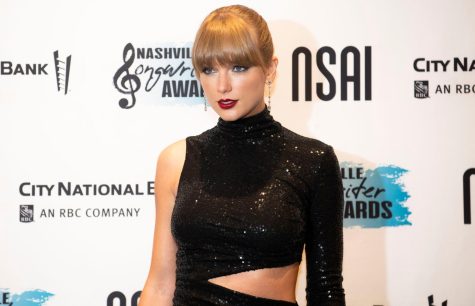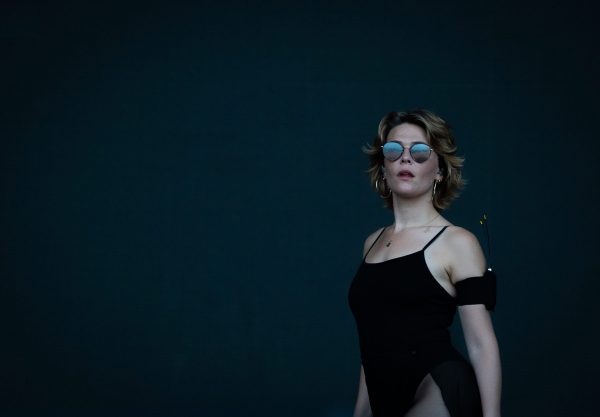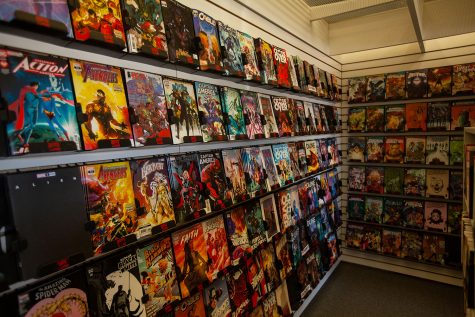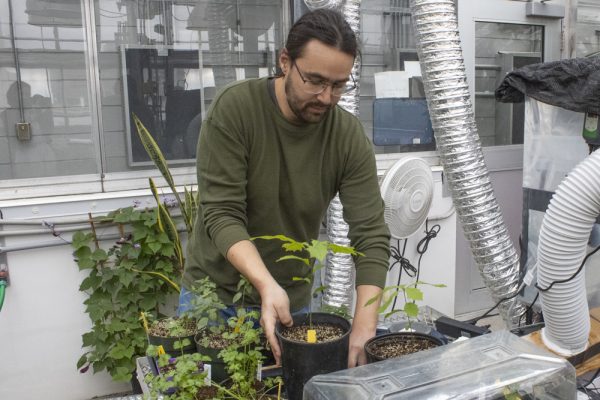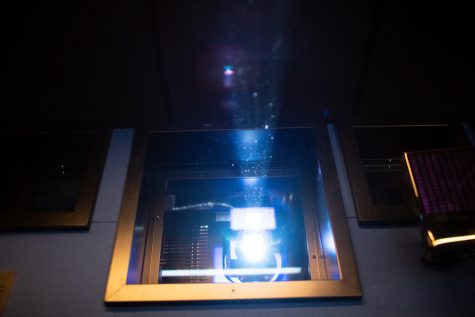Iowa Directors Festival returns, presents four unique shows
The festival, taking place over the course of two weekends, will present four drastically different performances brought together by a strong community.
Actors perform during warmups of “England’s Splendid Daughters,” in the University of Iowa’s Theatre Building on Tuesday, Jan. 25, 2022.
January 25, 2022
In the theater, behind the costumes, makeup, and bright stage lights are long hours of rehearsal and relationships built over time — a community.
The University of Iowa’s theater program is known for giving students a hand in all aspects of production. The Iowa Directors Festival will be one such event, intended to give UI second-year students in the MFA directing program a chance to create a larger-scale production compared to their previous works in the program.
This year, the festival will be held in the Theatre Building over the course of two weekends. The show small hours and Letters From Cuba will be performed together from Feb. 3 to 5. England’s Splendid Daughters and Talk to Me Like the Rain and Let Me Listen will show on Feb. 10 to 12.
Production Stage Manager Dylan Nicole Martin oversees all four shows, tasked with the responsibility of supporting several casts and technical crews. From the actors and directors to the tech team and costume crew, Martin ensures that the production process runs smoothly.
“I just fell in love with being the hub of communication on a piece, because I get to see the artistic and administrative sides and I get to support people in very logistical ways,” Martin said. “It’s the personal side and the practical side that I get to balance, and it’s a real joy.”
Martin has also communicated with program instructors, collaborating to solidify educational goals.
“It’s been a beautiful dance to watch that give and take, and to see people brave enough to ask for what they want, because that can be really hard,” Martin said. “No one does art because it’s easy. Everyone is there because they wake up and they can do nothing but make theater. To share that together and feel that exchange of energy is my favorite part.”
small hours
The four productions showing during the festival are dramatically different from one other. The show small hours, directed by Sarah Gazdowicz, is a one-woman performance giving an introspective view of a woman struggling with her own identity and purpose after giving birth.
“There isn’t a lot of dialogue,” Gazdowicz said. “Most of it is direction that is given to the actor that they then interpret, and that we interpret and give motivation to and intention.”
Gazdowicz’s goal as a theater director, she said, is to find the meaning of the work she organizes. She takes the words printed on the script and does everything in her ability to communicate those themes on stage.
“It’s about finding what is the most fundamental nucleus of what is happening in the story,” Gazdowicz said. “What I think is really cool about theater as an art form is that you can find ways to reflect that and explode it out of a realistic setting or format.”
RELATED: UI Theatre Department’s ‘Borderless’ presents audio experience that uplifts LGBTQ+ history
Letters From Cuba
Showing the same weekend of small hours, Letters From Cuba tells the story of siblings who are separated by physical space; one lives in New York, the other in Cuba. Natalie Villamonte Zito, the director of the piece, said she has a strong emotional connection to the work.
She said especially during a time of social and political strife, having stories about love is essential.
“Thinking of borders and thinking of separating people and separating families is something that really affects me, is something that’s really important to me,” Zito said.
Theater, for Zito, is all about interpersonal connections and humanity. The concept of storytelling and collaboration through one medium is what makes theater such a driving passion, she said.
“You get to work with people, and we’re really exploring humanity,” Zito said. “We’re exploring what makes someone human, what makes our connections, and how do we further these connections and understanding.”
England’s Splendid Daughters
England’s Splendid Daughters, written and directed by Ann Kreitman, shows the second weekend of the Iowa Director’s Festival. Themes of community and togetherness tell the story of lesbian ambulance drivers during the first World War.
Unique struggles arose as Kreitman directed a play that she wrote. England’s Splendid Daughters had been in the works for several years, but because of COVID-19-related cancellations, it was unable to be performed until now. It was also a new challenge for Kreitman to take on both a directing and playwriting role.
“It’s definitely a tricky thing, to direct a play you’ve written. It takes a lot of letting go,” Kreitman said. “I see directing as each rehearsal, you are giving the play away more and more to your cast. So, on opening night, it’s not my play anymore. It belongs to the cast.”
The focus of celebrating the LGBTQ+ community’s innate strength is personal — Kreitman is the associate director of the LGBTQ Iowa Archives and Library, which acted as an element of inspiration for her play.
“The work that we do there has really taught me that it is necessary to kind of put out a queer beacon for people in Iowa when often they feel very isolated, or they don’t have the resources that they need, or the Iowa legislature is actively attacking their rights every year,” Kreitman said.
RELATED: Hancher’s ‘An Officer and A Gentleman’ delivers almost everything you could want in a musical
Talk to Me Like the Rain and Let Me Listen
Talk to Me Like the Rain and Let Me Listen, directed by Kenneth Collins, will also take place the second weekend of the festival. The play is an exchange of stories between a man and a woman, one looking in the past and the other looking to the future.
Collins’ main point of direction focuses on the artistic elements. He balances space and time to create work that evokes an emotional response.
“I think of myself primarily as an artist. Even though I’m here studying directing and digital media design, I don’t necessarily think of myself as primarily a director or designer,” Collins said. “I think of myself as an artist who happens to be working within a particular form. My training and background in visual arts and my background in writing manifest in combination.”
Collins said he also has a background in meditation that he uses to guide his directing work. Rather than focusing on the theme or deeper meaning that a piece is meant to evoke, Collins highlights audience attention and awareness.
“The main focus is to try to create a scenario in which an audience can become aware of the quality of their own attention,” Collins said.
Despite the differences between the various shows within the Iowa Directors Festival, the purpose of theater is still clear – community. The varying directors, actors, actresses, the costume designer, and the production stage manager all collaborate to create a space for everyone to flourish.
“My focus has really been in trying to get clarity and simplicity because you have so many people who have been here for years and years and years, or only a few years or students who have come in and, in the department, have been in the department for a few years now, but never done a show in person,” Martin said.



